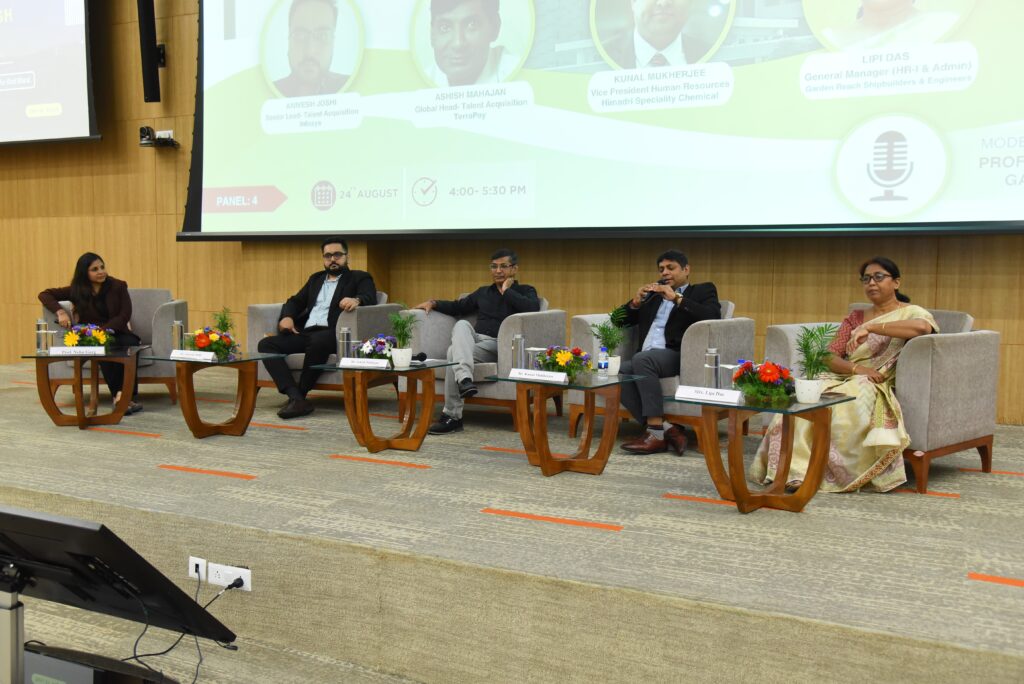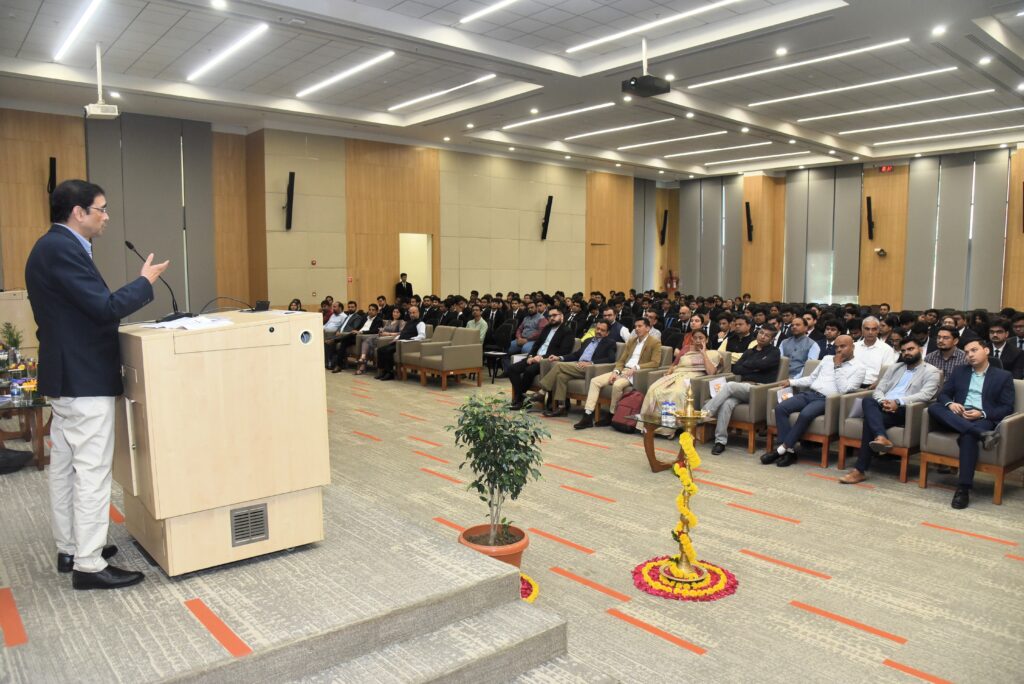Nagpur, 24th of August, 2024 : The 6th Edition of the HR Conclave – Utkarsh 6.0 concluded at IIM Nagpur with panel discussions on leading transformations for the Viksit Bharat (developed India). “Primarily themed for the IIM Nagpur students to avail best possible opportunities to interact with the industry leaders who have shaped organizations and can mentor them for their overall grooming and mentoring,” said Professor Shailendra Nigam, CDS Chair at IIM Nagpur while welcoming the dignitaries.

Mr. Mussarat Hussain, Head HR, Suzuki R&D Centre India Pvt. Ltd., said, “Talent acquisition needs to be redefined in the current context as the world is one now.”“The central question of where to access talent and how to retain it for organizations’ constant success. There is a need to foresee an industry-friendly India where laws, flexibility, and strategies attract industries,” he added.
Experts and speakers, including HR Mentors, Academicians, and Corporate Leaders, focused on leveraging technology in Utkarsh 6.0. Factors like adopting the latest technology tools, keen focus on quality education to bridge the knowledge gap and develop raw talent into touchstones, timely social shift to lessen generational gaps, inclusive culture, keen focus on health and well-being, and perfect talent acquisition strategies are paramount.
The Utkarsh 6.0 had four panels on the themes ‘Transformational Leadership for Innovation and Development’, ‘Building Inclusive Organizations for Future Growth’, ‘Future Skills and Talent Development’, and ‘Workplace Agility and Resilience’, all of which are relevant and apt in the current context.

Mr. AK Tewari, Joint President, HR, Administration & Corporate Affairs, MP Birla Corp. Ltd., said that “Every Manager is an HR Manager as the person deals with the humans although several tasks get fulfilled by the machines or AI assistance but yet the core is human-centric.” He further said that the five M’s of Management include Men, Materials, Machines, Money, and Method. Yet, the workforce remains the most important because AI can’t replace the human brain. Innovation is not merely creating something but changing the existing environment. Focusing on the 17 Sustainable Goals is essential for fulfilling the Viksit Bharat ambition.
Mr. Ritesh Agrawal, Head HR, PepsiCo Thailand joined online from Thailand and said that the core theme revolved around understanding the dynamics of change versus transformation. He also outlined the journey of change in three key stages: Resistance, Innovation, and Sustainable Development Goals. Leaders must strive for transformative results instead of mere incremental changes, he said.
Mr. BibhutiRanjan Pradhan, Executive Director & Head, Indian Oil Institute of Petroleum Management, emphasized balancing company gains and human gains. He said that in order to achieve the best version of the world, we need to learn to give back to society. Storytelling and communication are critical factors in determining the result.Likewise, Capt. (Dr.) Pranav Prasoon, Chief People Officer, TruKKer, enlightened the audience with ideas to shatter conventional patterns. A crucial insight is that thinking differently sometimes means venturing outside the box. Occasionally, a fresh perspective within the box can uncover solutions hiding in plain sight.
Mr. Hari Menon, Chief HR Officer, Mitsui O.S.K. Lines, emphasized that if having a goal, let that happen for real success. It will determine the Viksit Bharat concept. Even making mistakes remains the 1st part of innovation, he said.
Mr. Kaushik Mitter, Senior VP Human Resources, Reliance JioInfocommsaid diversity, equity, and inclusion are the three keywords that we should focus on to build a healthy business society for women. Almost 25% of the workforce at entry levels is constituted by women, but as we go higher up the rungs, the percentage reduces to 5% only. We need to build leaders with an inclusive mindset in order to progress in the business world.Likewise, Mr. Sushanth Kumar, Talent Acquisition Manager, Brillio,mentioned that for inclusion, we need to try to set up targets earlier in the company, build leadership programs for women, and provide training to reduce biases.Mr. S Paul Ragavendran, Country HR Leader, Mitsui O.S.K. Lines, said that visible and invisible aspects of diversity need to be understood. Inclusion is important as it leads to innovation.
Ms. Garima Sharma, Head HR, NASSCOM, said that the ability to learn technology is important in today’s competitive world to gain an edge in critical thinking and problem-solving, whereas Mr. VeerappajiShivanna, AVP Early Careers, Standard Chartered Bank, mentioned that we must train the future generation to solve future problems for better sustainability.
Dr. Ajay Brahmbhatt, Indian Lead- University Relations, Siemens,said that the difference between AI and humans is the heart and emotions, while the combination of brain and emotions brings innovation. Mr. RaizadaSorabh Bali, Partner and Principal, Posterity Consulting,spoke about strategies for entering the market and ascertaining adaptability, which is the ultimate solution.
The panelists at Utkarsh 6.0 addressed the HR professionals’ most pressing issues, including Skills and Talent Development. They emphasized the critical importance of continuously updating skills. Another significant insight is the optimal use of AI. We learned that AI can be a tremendous asset when leveraged appropriately. Its thoughtful application not only ensures comprehensive development but also facilitates skill advancement. The discussion also delved into the concept of generational culture. This ongoing cycle requires adaptability, and the best approach is to evolve it.
Mr. Anivesh Joshi, Senior Lead Talent Acquisition, Infosys, spoke about agility and having a better skillset. Mr.Ashish Mahajan, Global Head Talent Acquisition, TerraPay, described Mixology- agility is about mixing the differences together and how collaboration is critical because working in silos is impossible.

Mr. Kunal Mukherjee, VP Human Resources, HimadriSpeciality Chemical, illuminated diversity as a major factor in agility. It is essentially about how quickly you adapt to changes, thus planning your initiative to impact and return on investment. While Ms. Lipi Das, General Manager- HR-I & Admin, Garden Reach Shipbuilders & Engineers, mentioned that the question of how a PSU is agile might arise, but it is necessary to compete with other companies, as they have to fight for profiles.
Professor Prashant Gupta, Dean Faculty & Academicsat IIM Nagpur gave an overview of the Institute, highlighting its tremendous growth in its first decade and its emerging status as a new-generation IIM. Likewise, Professor Mukund Vyas, Dean Executive Education, highlighted the role IIM Nagpur has played with its exemplary Executive Education programs besides all other programs the Institute offers.











More Stories
Tripura Opposition Leader And CPI(M) State Secretary Jitendra Chaudhary As The New Central Committee Politburo Member Of CPI(M).
Prime Minister Narendra Modi Lays Foundation Stone, Inaugurates Development Works Worth Over ₹8,300 Crore In Rameswaram, Tamil Nadu.
World Health Day 2025.